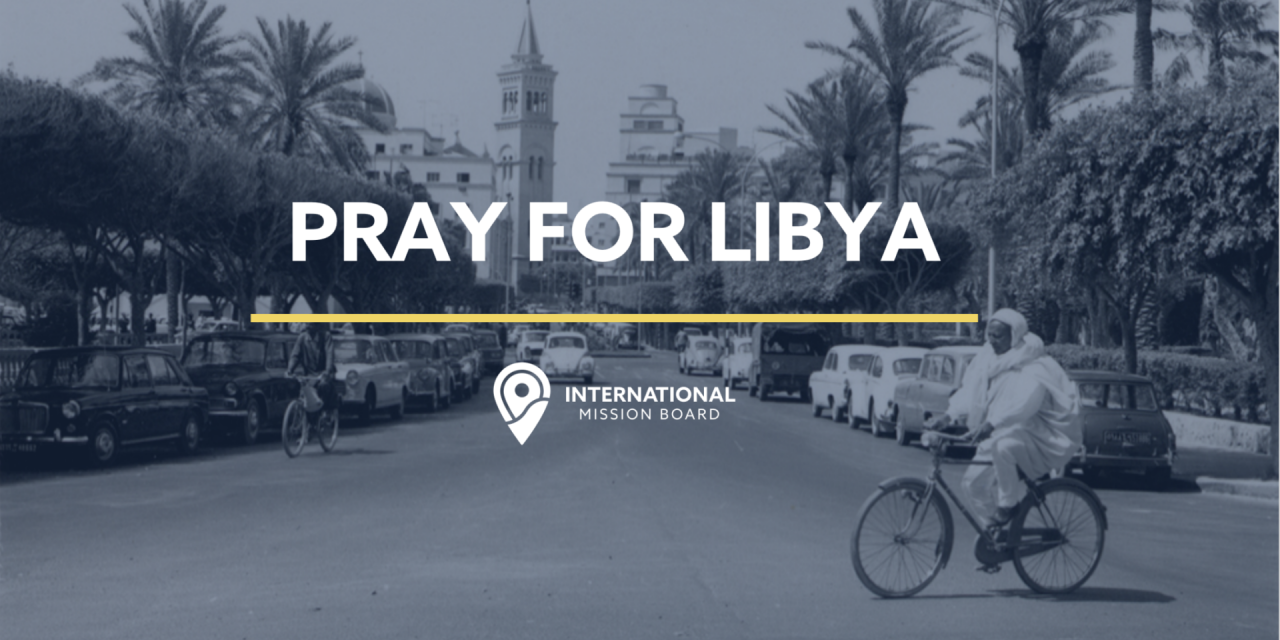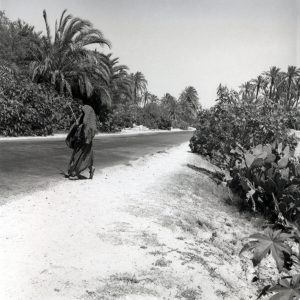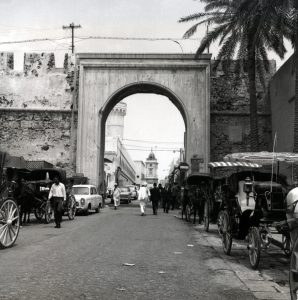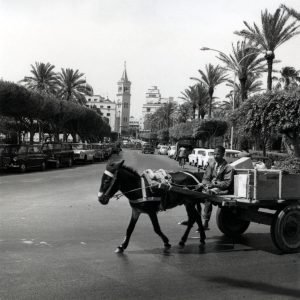Two stories worth of water wiped out land with Christian history and tradition dating back millennia on Sept. 11. Rain from Storm Daniel overwhelmed the dams in Derna, Libya, and the deluge claimed entire neighborhoods and the lives of thousands.
“In recent days, the world has witnessed unspeakable tragedies,” International Mission Board President Paul Chitwood said. “The death toll from the Morocco earthquake is nearing 3,000. In Libya, more than 11,000 have been reported dead in the floods and tens of thousands remain missing. These staggering numbers should alert the Church to the immediacy of our mission.”
Chitwood, who often speaks of the urgent need to reach the lost, prays Southern Baptists will respond to world events with prayer and renewed commitment to reach the lost.
“The daily death toll of people dying without Christ is much higher than what we’ve seen in these tragedies—173,451 people die every day without the hope of salvation. We don’t have time to wait. We must reach the lost and we must reach them as soon as possible,” he said.
The high number of North Africans dying without knowing Christ wasn’t always the case.
North Africa isn’t a region many think of as an epicenter of Christianity, yet its roots run deep and span the rise and fall of empires. The Berbers, also known as Amazigh, were the first inhabitants of North Africa.
They refer to themselves as “free people,” according to North African journalist and author Youcef. He hopes that his people will discover and claim their Christian inheritance. One of their own was a helper to Jesus in the hours leading up to the prophesied day that humanity waited centuries for.
Perhaps an understanding of God’s work among the people of North Africa will drive Christians to pray with greater fervency. May God complete the good work He started and bring salvation to the lost.
Song of Cyrene
Youcef committed his life to Christ 40 years ago after reading a New Testament a friend gave him. The friend received a copy from Christians in Switzerland. Three years after becoming a Christian, Youcef discovered Simon of Cyrene—the man enlisted to carry Jesus’ cross.
“Why did the Lord choose someone from North Africa to carry His cross?” Youcef wondered.
Simon’s story intrigued him, but references to Simon in the Bible are limited. Simon is only mentioned in Matt. 27:32, Mark 15:21 and Luke 23:26.
Youcef embarked on a journey to learn more.
Simon was a Berber from the ancient Libyan city of Cyrene. Until he read and investigated the passage, Youcef didn’t know Cyrene was in Libya. The city was decimated in an earthquake in the 4th century and is now called Shahat.
Cyrene is a short drive from Derna—where the dams released torrential waves. Excavations of Cyrene began in recent years; however, Youcef said the recent flood most likely wiped out what remained of the city. Through natural disasters and man-made leveling, Christianity’s rich legacy in the region has largely been washed from the memories of many, but that is something Youcef is praying he can help remedy.
Cyrene was founded in 631 BC by Greek migrants who fled from famine and went south to what is now known as Libya. At the time, Libya was the name given to all North Africa. Berbers already lived in the area, and they welcomed the Greeks. By 85 BC, Cyrene was home to Greeks, Berbers, Jews and other immigrants. The Berbers and Greeks built five cities that came to be called the Pentapolis, with Cyrene being the most important city—a city of philosophers and poets and a mix of Greek and Berber culture.
In 33 AD, Simon and his sons, Rufus and Alexander, made the pilgrimage from Cyrene to Jerusalem to celebrate Passover. Simon happened to be walking down the street at the same time soldiers were leading Jesus to His death. He was singled out and forced to carry Jesus’ cross to Golgotha.
According to Youcef’s research, Simon, Rufus and Alexander returned to Cyrene, and they visited synagogues to share that they met the Messiah. The word “Libya” means helper, and Simon, without knowing, ultimately went to Jerusalem to help Jesus.
Later, a group of believers began to preach the Gospel in Cyrene, and believers spread the Good News to Carthage, Tunisia and Alexandria, Egypt, key cities in the rise of Christianity.
Youcef’s research of Simon inspired him to write a book to chronicle the history of his people. He hopes to make his book into movies since many Berbers are oral learners. He wants to share the story of North African Christians, so they can discover their history and draw closer to the truths of the Bible.
Gospel helpers
Though Islam has been the reigning religion in North Africa for centuries, Christianity predates it.
“Why did such a Christian region leave the Lord and turn to Islam?” Youcef wondered. “Why did God allow that? And, with all the information we have today, why don’t (North Africans) ask themselves about what happened?”
Youcef was the fifth Christian in his city, that he was aware of. Through his research, he learned it wasn’t always this way. According to Tertullian, a prolific Berber Christian author, more than half of the population of North Africa were Christians. Each town averaged three churches, and there once were more than 20,000 bishops. Christians from Cyrene were important leaders in the early church.
Islamic immigrants led to the purging of many of the region’s Christians in the seventh century. Though there were Christians for two more centuries, the populations dwindled and disappeared with time. In the ensuing centuries, people came to believe Islam was always the faith of the land.
Cyrene’s legacy and hometown heroes are not so easily expunged from history.
Cyrene was also widely believed to be the birthplace of John Mark, more commonly known as Mark. He is credited by many as the author of the Gospel of Mark. Many believed he heard and recorded an account of Jesus’ life and ministry from Peter. Mark was the traveling companion of Barnabas, his cousin, and Paul, but the men parted ways after a disagreement. Mark established the first Christian church in Africa and was the first bishop of Alexandria, Egypt. The Coptic church continues to this day, and many churches in Egypt bear his name.
Lucius, mentioned in Acts 13, was also from Cyrene. Lucius was one of the founders of the church in Antioch. Famous Christian Berbers include Augustine, Tertullian and Cyprian.
Youcef said he “discovered that God has prepared a destiny for every nation.”
This region once had a thriving evangelical movement. Now, there is only a remnant, but the remnant is working to restore the holy seed that took root in the region so long ago. Youcef said the Gospel is spreading quietly and silently but also efficiently among local believers.
He says the destiny of North Africa is to play the role of a helper, like Simon, who came in quietly from behind to carry the weight of the cross. Berbers helped take the Gospel across the region and to Europe, and they continue to be helpers of the gospel.
“We need more workers, as Jesus said. We need people who go and spread the Gospel, either physically, or by technical means,” Youcef said.
North Africa needs more Christians like Mark, Simon, Rufus, Alexander and Lucius to spread the Gospel. Join him in praying more Christians will boldly share their faith.
Youcef hopes God will give boldness to the Algerian, Tunisian, Libyan and Moroccan church leaders who have this desire—not only to lead a community of faith but to go and reach the lost.
*Some names may have been changed for security purposes.







